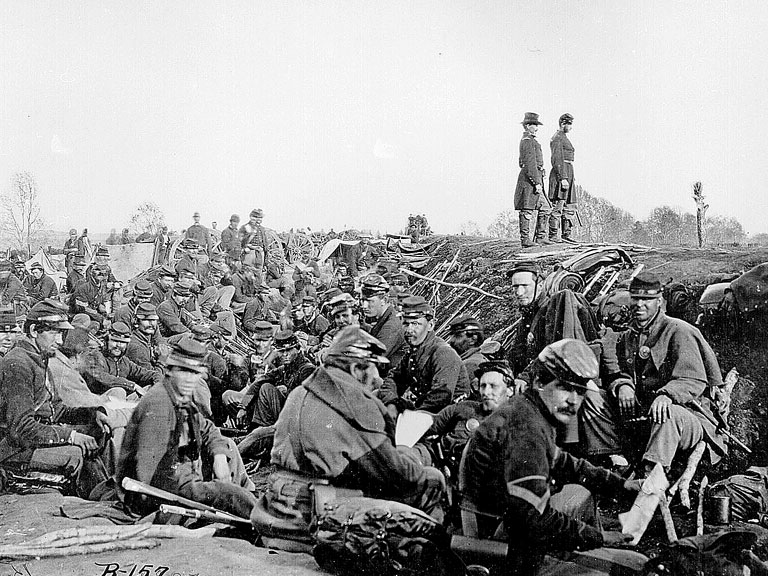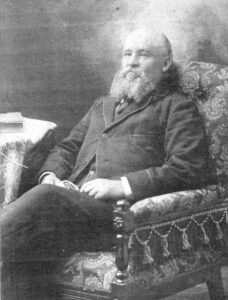County News
Remembering Reuben Pearce

Descendant of Wellington resident shares fascinating history
Eleven years ago to the day, Mark Pearce wrote about his great-great grandfather on these pages on Remembrance Day. The year was 2009. The date is significant because it commemorated the 100th anniversary of the death of Reuben Pearce: military man, family man, County farmer, Wellington resident and respected community member. While Mark shared details of his descendant on that Remembrance Day, depicting a remarkable man who had accomplished some extraordinary achievements during a remarkable lifetime, Mark was quick to highlight how this Wellington farmer played a role in the American Civil War (April 12, 1861 to May 13, 1865).
Mark expressed that while Remembrance Day looks to the conflicts and sacrifices of the First World War and the Second World War, among others, the American Civil War often doesn’t get a mention. “Over 50,000 Canadians fought in the American Civil War from 1861 to 1865,” reminds Mark Pearce, great-great-grandson of Reuben Pearce. In what was to become an interesting and long life, Reuben Pearce made several brave, even unfathomable, decisions, where the fascinating story of an ordinary life centred in Wellington included the extraordinary choice to enlist in the United States Army. On a seemingly random day at the end of 1863, at the age of 29, Reuben made his way from his Wellington, Ontario home to Lockport, New York. This Wellington resident fought in the American Civil War: injured and hospitalized, captured and imprisoned, he survived, to be released from prison on April 19, 1865.

Reuben Pearce, October, 16, 1834 to November 18, 1909.
Life for Reuben Pearce began in England in October 1834, where he grew up near Paddington, London. Born into a wealthy family, and following in the family livery stabling business, Reuben soon got itchy feet and with a keen sense of adventure decided to emigrate to Canada, by himself. The year was 1854 and Reuben was just 19 years old. While it is unknown why Reuben chose Wellington to settle, Mark believes the decision was made with the aid of emigration commissioners in England who helped prospective emigrants. He notes that Prince Edward County was well established in 1854 and was known for its good farmland and prosperous communities.
With financial support from his father to get him started in his new venture, Reuben purchased land just north of Wellington on County Road 2, on the west side of the road. He remained at this farm for 27 years, from 1854 to 1881. Mark isn’t certain of the exact location and believes the original home no longer exists. Barely 20 years old when he arrived in Prince Edward County, Reuben remained a Wellington area resident for 55 years, up until his death in 1909.
“With no background in farming, Reuben began his life as a farmer,” explains Mark. “Farming was a tough life, and family records indicate that he was not really much of a farmer.” Mark adds how Reuben sometimes supplemented his income working as a mason, something that would eventually become his primary trade. And while life as a farmer in Prince Edward County in the mid-19th century was a hard life for Reuben, he was to discover life in the Civil War was even more so.
In 1855, one year after arriving in Canada, and landing in Wellington, Reuben Pearce married local girl Sophia Hazard (1839 to 1898) when he was 21 years old, and by 1863 he was the father of four young children. Of note, and at the centre of Reuben’s later life for more than 20 years, is the 100-acre Pearce homestead (circa 1867) located at 1244 County Road 2, which still stands today. Known as the Anderson/Bright house (now referred to as The Brighthouse Farm), the former dairy farm has undergone sympathetic restoration and now functions as an Airbnb and event venue. Locals heading out of Wellington, north to Belleville, will recall the large imposing farmhouse to the east, sitting a little back from the road, which operated for a number of years as a glass artist’s studio and gallery.
The Pearces lived in this farmhouse, located across the road and not far from their first farm, from 1881 until 1903. “Reuben sold the farm to his son, Charles Pearce, in 1899, but continued to live there until 1903,” says Mark. The home would have looked quite different back then as Mark confirms it was substantially extended in 1904 by the new owner. “Charles sold the farm, moving to a property located at the corner of Main Street and Consecon Street in Wellington,” he says. Reuben lived with his son’s family, Charles Pearce and his wife Lena Calnan, from 1903 until his death in 1909. “Charles was the first police constable of Wellington, and in later years, he and his daughter, Winnifred Agnes Pearce, operated a weekly newspaper, the Wellington News, out of their home,” explains Mark, who isn’t sure if they founded the newspaper or how long it operated.
Struggling for a number of years as a farmer, a life he found very difficult, all while raising his family with four young children, Reuben saw an opportunity to enlist in the United States Army, to fight for the Union side (also known as the North). “Desperate to recruit soldiers, the Union Army offered a bounty of $300 (about $7,700 today) to enlist, plus a monthly wage of $13 (about $270 today), and a pension for life, once qualified,” says Mark. “Reuben saw this as a great opportunity to make money and decided to enlist, something his wife did not agree with.” Reuben joined up anyway. According to family members, the story goes that Reuben was pumping water from the well one morning. “He left the pail on top of the well, walked away from the farm without saying a word to anyone,” shares Mark. It was November 1863, the mid-point of the American Civil War.
Reuben Pearce is buried in the Wellington Cemetery located at 104 Consecon Stret, Wellington, where he shares a headstone with Charles and Lena Pearce. On the 100th anniversary of his death in 2009, a special marker from the United States Department of Veterans Affairs in Washington was placed at the gravesite in recognition of his service during the Civil War. “The Royal Canadian Legion, Wellington Branch 160, did a Colour Party tribute at his gravesite once the marker had been placed,” adds Mark. Reuben Pearce’s intriguing life and his role in the Civil War will continue to be shared on these pages in the coming weeks. Mark Pearce’s self-published book, Reuben Pearce: A County Farmer and American Civil War Veteran is available at Books & Company in Picton.

Comments (0)